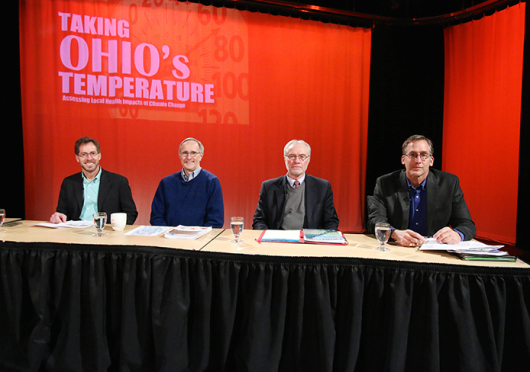
Edward Maibach (left), David Bromwich, Jeffrey Reutter and Richard Hicks pose at a panel event on climate change at the WOSU studios at COSI in Columbus on Feb. 19. Credit: Yann Schreiber / Lantern reporter
The weather outside might be frightfully cold, but a panel of Ohio State, George Mason University and Columbus Public Health officials met last Thursday to discuss how the Earth as a whole is getting warmer.
In a science forum presented by the OSU School of Communication, The Research Institute at Nationwide Children’s Hospital, the Center of Science and Industry and WOSU at COSI, called “Taking Ohio’s Temperature: Assessing Local Health Impacts of Climate Change,” the experts urged voters to voice their concerns on climate change to their elected officials, and said family doctors were among the best and most trusted people to inform on the dangers of a changing climate.
The forum was taped at the WOSU studios at COSI.
“The one most important thing that every American can do is pick up the phone and call your representatives in government,” said Edward Maibach, professor and director of the Center for Climate Change Communication at George Mason University. “Our elected officials tell me … that they are not hearing from their constituents on this issue.”
This comes as scientists are becoming increasingly confident about the human causes of climate change.
“Human influence on the climate system is clear, and recent anthropogenic emissions of greenhouse gases are the highest in history,” states the latest 2014 report of the Intergovernmental Panel on Climate Change, a UN-backed body of international climate experts. “Recent climate changes have had widespread impacts on human and natural systems.”
David Bromwich, a professor of geography and senior research scientist at the Byrd Polar and Climate Research Center at OSU, agreed with the IPCC’s observations.
“In the scientific community it is almost … unanimous that climate change is happening and is human-caused primarily, and the impacts are likely to be dramatic,” he said.
And these effects are likely to be visible in Ohio as well, where more severe weather phenomena are expected, impacting areas as diverse as future crop yields or the region’s fisheries, according to a fact sheet handed out at the panel.
“The consensus right now on climate change occurring is about the same as it was about the dangers of smoking, and yet we’re not taking the kinds of action,” said Jeffrey Reutter, director of the OSU Sea Grant College Program and Stone Laboratory. “We are getting a much greater frequency of these severe irregular storms … We are having 100-year storms every five years.”
Richard Hicks, director of the Office of Health Planning at Columbus Public Health, also mentioned stormy weather as an indication of a changing climate.
“In the central United States, the biggest issues really are probably going to come from extreme weather,” Hicks said, citing extreme rain and snowfall.
But not only the weather reflects climate change — the change in the planet’s natural systems is also likely to impact our health.
However, people do not associate health issues with climate change, Maibach said, adding, “the family doctor is the most trusted messenger to explain the health ramification, the health impact of climate change.”
Impacts on public health include increasing respiratory problems because of polluted air, as well as higher rates of infectious insect and water-borne diseases, Maibach said.
Hicks explained what would cause the rise in insect populations.
“As the climate warms, these insects will have a greater range of habitat, be able to live in a greater area of the country and expose more people to risk,” he said. He also added that food security and supply will also be impacted by severe weather and climate change.
Grabbing people’s attention is crucial to both scientists and the public, but doing so can be difficult, the experts said.
“Americans have some pretty important misconceptions about climate change,” Maibach said. “While most of us understand that the climate is changing, only about half of us correctly understand that human activity is driving the change. We tend to see the problem as a distant problem, both distant in space and time.”
Hicks also stressed the difference between weather, which is “what is happening right now, today” and climate, which is about “general characteristics over a long period,” typically 30-40 years or more.
“The (climate) changes so far have been relatively slow and not very obvious,” Bromwich said. But, he added, “it’s the really big events,” like severe storms or floodings, “that grab people’s attention.”
The panel was part of a series named “Health Science Frontiers,” a health education project funded by the Research Institute at Nationwide Children’s Hospital and the School of Communication through an OSU outreach grant, said Erik Nisbet, an associate professor at the School of Communication, who helped coordinate the panel.
The panel, which was the third this academic year, will be aired on WOSU in late spring or during the summer, Nisbet said.


